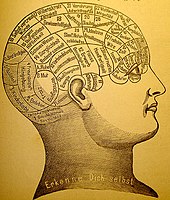
Photo from wikipedia
Significance Differential treatment of animate and inanimate objects often hinges on mind perception—the attribution of mental states to others. It has already been established that pictures of animate objects can… Click to show full abstract
Significance Differential treatment of animate and inanimate objects often hinges on mind perception—the attribution of mental states to others. It has already been established that pictures of animate objects can elicit mind perception, albeit at reduced intensity. However, this loss of intensity is assumed to reflect an impoverishment of a rich stimulus, such as the projection of a living being into a static picture plane. The current study overturns this assumption by showing that “pure” abstraction can reduce mind perception independent of stimulus richness. Depicting things with minds raises ethical questions that have not been recognized previously. As these questions emerge from representational structure rather than representational content, they are unlikely to be quashed by improvements in image quality. Throughout our species history, humans have created pictures. The resulting picture record reveals an overwhelming preference for depicting things with minds. This preference suggests that pictures capture something of the mind that is significant to us, albeit at reduced potency. Here, we show that abstraction dims the perceived mind, even within the same picture. In a series of experiments, people were perceived as more real, and higher in both Agency (ability to do) and Experience (ability to feel), when they were presented as pictures than when they were presented as pictures of pictures. This pattern persisted across different tasks and even when comparators were matched for identity and image size. Viewers spontaneously discriminated between different levels of abstraction during eye tracking and were less willing to share money with a more abstracted person in a dictator game. Given that mind perception underpins moral judgement, our findings suggest that depicted persons will receive greater or lesser ethical consideration, depending on the level of abstraction.
Journal Title: Proceedings of the National Academy of Sciences of the United States of America
Year Published: 2021
Link to full text (if available)
Share on Social Media: Sign Up to like & get
recommendations!